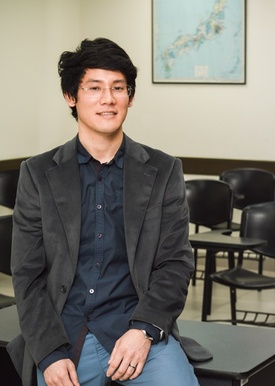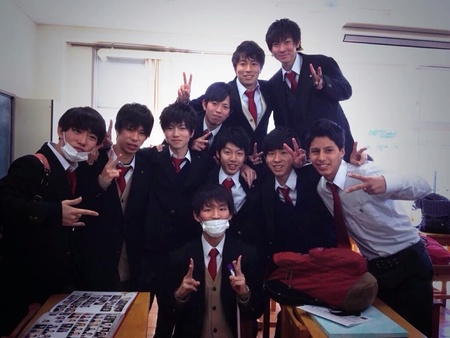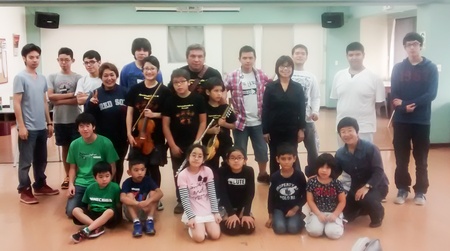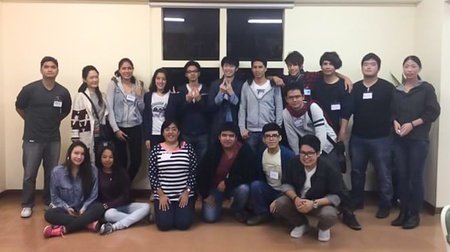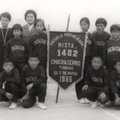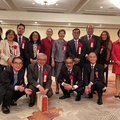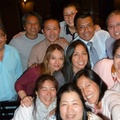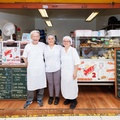They were raised and educated in Japan. Their parents took them to Peru after finishing their primary or secondary studies. They are bilingual. They study and work. They like Peru.
They are friends, they joke, they laugh, but above all they share the experience of being children of dekasegi. Only they can truly understand what it means to feel lost in Peru and long for Japan, the frustration of wanting to express themselves in Spanish and not finding the right words, the difficulty of adapting to a new social environment, the pain of feeling that no one understands them.
Only they can appreciate, some time later, the relief of discovering that they are not alone, that there are other dekasegi children who understand them perfectly because they are in the same situation, the joy of feeling not only that they have adapted to Peru, but also that They already consider it their home.
The oldest is Carlos Toma. She is 27 years old and has lived in Peru since she was 12. The youngest is Natsumi Oyanagi. He is 17 years old and, like Carlos, he arrived in Peru at 12. In the middle is Augusto Miranda. He is 20 years old and has lived in Peru for two years.
Carlos's parents immigrated to Japan in the 1980s. His mother returned to Peru to give birth. He was born here, but was taken to Japan as a baby. When he finished primary school, the whole family – his parents, his younger brother and him – came to Peru. Carlos studied administration and next year he will complete engineering. For eight years he has been teaching Japanese at the Peruvian Japanese Cultural Center.
Natsumi was born in Kanagawa Prefecture and finished primary school in Japan. He studies international business in the mornings and works in a restaurant at night.
Augusto completed his education (primary, middle school and high school) in Japan, where he was taken when he was about a year old, and for about six months he has been working as an administrative assistant in the Japanese Language Dissemination Department of the Japanese Peruvian Association (APJ). ). In addition, he is preparing to be a nihongo teacher and has begun his studies in international business.
WHEN LOVE SCARES
Nothing prepared them for what they would find in Peru: not the traffic chaos, the insecurity or the hustle and bustle, but its people, welcoming and lavish in affection. At first, it was strange, uncomfortable. Afterwards, it was great.
Before starting her high school studies at La Victoria school, having recently arrived from Japan, Natsumi feared that being new and not knowing anyone would make her a victim of bullying. Quite the opposite happened.
“I am very shy and here people are very sociable, and I felt like everyone was clinging to me because I was new and that made me uncomfortable. But then I got used to it. Because there (in Japan) they are more or less cold. If you are new, you have to come and talk. On the other hand, here everyone comes up to you, they say 'what's your name?', 'how old are you?'. “It shocked me.”
Natsumi quickly made friends. With them he improved his Spanish. In Japan, her mother spoke to her in Spanish and she responded in Japanese. I understood Spanish, but not enough to construct a complete sentence. Today he masters it, but prefers to speak in Japanese.
His teachers also provided him with valuable support. They were understanding and patient with her. After studying for two years in La Victoria, he moved to another school, where he also found friendly classmates (“as soon as I entered, everyone started talking to me”) and teachers who repeated things to him that he did not understand. That encouraged her to be a good student. He had to repay his teachers' support by working hard in his studies.
Carlos was also shocked by the move. He says it was a shock. He entered high school and found it very difficult to make friends at school. In Japan people are colder, he says. “When you get to know a person there is always a wall between the two, but here people are happier, warmer. "I couldn't, I formed a wall."
It was very difficult for him to open up to others. When he was 14 years old, his mother made a decision that was key in his life: taking him to a conversation club in the APJ where he met other children of dekasegi, with whom he shared the same experience and topics of conversation. There the wall he built between the world and him began to fall.
He had no major problems with the language. In Japan he took correspondence classes in the Peruvian educational system and his mother taught him Spanish. His parents were clear: they were only in Japan to save. That is why they prepared their children for the return to Peru.
Augusto confesses that at first so much public affection disturbed him. “Here (couples) hug, they hold hands, there in Japan they don't... There, my friends are with their lovers from afar. For me that was normal. I get here and everyone kisses (laughs). That scared me, but little by little, I'm two years old now, I've adapted. “I like that, they are more affectionate, they are showing their feelings.”
Although he is fluent in Spanish (which he learned in Japan with his parents), Augusto feels more comfortable speaking in Japanese. He says that what shocked him the most at the beginning was wanting to say one thing and not being able to. The words escaped him.
When he first arrived in the country, he was inactive for six months, adrift, not knowing what to do. “I kept thinking about what I'm doing here, what my dream is, what my goal is.” He then found work in the warehouse of a book distributor and began studying English.
“THE CHINITOS ARE IN FASHION”
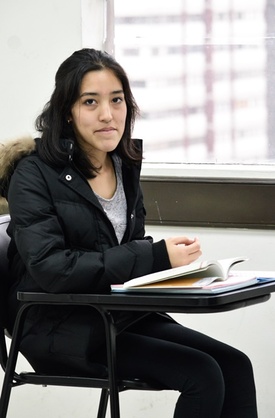
Natsumi is delighted with the people in Peru. “They are very friendly. Sometimes there are bitter ones, but I have always had good people. The people are noble, very good people.” He says that the Japanese “are kind, but serious, whereas here they are kind and affectionate.” Plus, he finds haggling fun.
Carlos corroborates: in Peru “if the person is kind, it is because they want to be kind to you.” In Japan they are kind because they have to fulfill an image before society.
Since December of last year Natsumi has been working as a waitress in a restaurant. He likes his job because it allows him to meet people and fight his shyness. “I have to talk to people I don't know,” he says.
She remembers that on her first day at the restaurant she was so nervous that she stuttered. Now she is fine, happy, getting more and more used to dealing with clients.
Anyone who has just arrived from Japan to Peru, whether child or adult, is scared by painting a terrifying picture of the country. They recommended to Natsumi not to speak Japanese in the street, not to take out her cell phone, and if she came across people with “strange faces” they told her “that's stupid.” I was afraid, I was bewildered (“I didn't know what to do on the street”). Now she is just another Lima native. Know the streets, walk alone and enjoy your freedom.
Natsumi remembers that at first, when she saw garbage in the streets or that the traffic lights were not respected, she thought “what an ugly Peru.” When did your perception of the country change? “When I started to see the good things about Peru and not just the bad,” he answers. The good thing is the kindness of the people.
For his part, Carlos says: “Before coming (to Peru), they told me a lot of things: 'Don't go out on the street at night because they are going to rob you', 'be careful because they can catch you as a fool', 'don't believe anything they tell you'. A lot of things like that, negative, things that really aren't like that. “I have never been scammed and thank God I have never been robbed.”
Unfortunately, Augusto cannot say the same. He has only been in Peru for two years, but he has already been robbed three times. “They don't let me go out on the street, they tell me 'don't let them serve you beer, liquor,'” he says.
Augusto misses his friends in Japan very much, while Carlos has already lost contact with his friends. In the middle of the dialogue, they both discover, laughing, that they envy each other:
–I envy Augusto. In our circle (of dekasegi children) there are several boys who have returned at 18, 19 years old, and they do have friends in Japan. “It makes me envious,” says Carlos.
–I'm also envious because he has more friends here, I don't have any. I will have, but few. Here he already knows everything. There I have more (friends), but here I have less – Augusto replies.
“Yours is just a matter of time,” says Carlos in a friendly tone.
Coming from a country where people do not usually hug or kiss in public can cause misunderstandings in Peru. Carlos remembers:
–When I first arrived and the girls greeted me, they approached me, they gave me a kiss on the cheek. I was excited. I said “Chinese people are in fashion” (laughs). Until I saw that they did it with everyone. There (in Japan) there is no physical contact.
JOBS FALLEN FROM THE SKY
At school Natsumi was used to teachers paying attention to the students (if they do their homework, if they attend classes, etc.). At the university, the professors teach their classes and that's it, the rest is up to the student. That's good because it makes her more responsible. “I have to worry myself, it makes me put more energy into studying.”
After finishing school, Carlos got a position as a nihongo teacher at the APJ. It was his salvation. Since then his teaching work helps him pay for his studies. “It fell from the sky, I was between any job (in Peru) or they would send me to Japan.”
Carlos says that the best thing about his job is the variety, because he teaches students of different levels and with a wide range of personalities, and even ages, from the boy who is a fan of manga and anime to the retiree who now has time to study. . “You also learn,” he says.
Being bilingual has allowed him to get several jobs. He has traveled to Piura in the summer to work as an interpreter for a company that exports mangoes to Japan and received visits from Japanese inspectors. “Doors open up for you, new experiences,” he highlights.
Augusto agrees with Carlos that the job in the Japanese language department has “fallen from the sky” for him. “I have learned a lot,” he says. He has improved his Spanish, is getting used to writing, has expanded his vocabulary in Japanese and is part of the challenge of promoting nihongo in Peru.
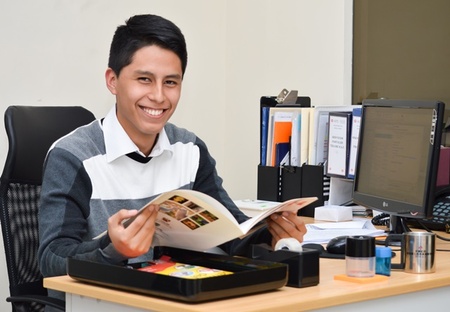
PERU? JAPAN? IN THE MIDDLE
Carlos says that the most important thing that Japan left him are values: “Don't throw trash, clean up after yourself, order. They miss each other. Here you stop wherever you want, you run the red light. You start to think why it is like this. “Values start from childhood.”
He explains that children in schools in Japan do cleaning work and are in charge of school lunch, among other tasks that prefigure future model citizens. They teach them to be responsible. In addition, emphasis is placed on art, sports, music.
He believes that Peru would be a different country if it did something similar, but when it occurred to him to propose it, he was told that parents would not accept that their children do cleaning work ("the parents have a fit, 'I pay and my son cleans the bathroom'").
However, he clarifies, in Japan there is too much social pressure that leads to suicides. In Peru, on the other hand, people “live well in their own way.” The ideal? An intermediate point between Japan and Peru. “Neither here nor there, the middle is good.”
Augusto, who has worked in both countries, intervenes: “There they work 100%, 120% concentrated. I think they were born to work, they are not enjoying life. On the other hand, not here, you are working and at the same time enjoying life.”
Do you plan to return to Japan? Natsumi says she would like to, but she also wants to visit countries like Israel and Türkiye. First he has to finish his studies, then we will see. Carlos plans to return to Japan to study for a master's degree. Augusto would also like to return to Japan, but he doesn't know whether to stay. In Peru, between studies and work, he has already found his way.
WORKSHOPS FOR PEOPLE LIKE YOU
Carlos remembers that his mother forced him to go to the APJ's Donguri Club, a conversation workshop aimed at children and adolescents who had come from Japan, so that he would not forget Japanese. Now he thanks you. Even though he managed to maintain the nihongo , he found human ties, empathy, and connections, which were fundamental for his adaptation to Peru. He is currently part of the workshop staff.
For their part, Natsumi and Augusto are part of Shaberankai, a Japanese language workshop for young people, also from the APJ.
Carlos considers in general terms that the boys who came from Japan have known how to adapt to Peru. He is glad that Augusto has decided to study international business because it strengthens his decision to continue in Peru.
However, he says that there are many who return to Japan because they never feel comfortable in Peru. They are disoriented, they don't know what to do with their lives, they feel like they don't fit in. There are kids who are just waiting to turn 18 to return to Japan.
“Here there are opportunities that open up to you by mastering both languages,” says Carlos. Both Augusto and he hope that Donguri and Shaberankai become better known so that kids who today are as they both once felt, alone and misunderstood, find company and direction in their lives.
* This article is published thanks to the agreement between the Peruvian Japanese Association (APJ) and the Discover Nikkei Project. Article originally published in Kaikan magazine No. 104, and adapted for Discover Nikkei.
© 2016 Texto y fotos: Asociación Peruano Japonesa



